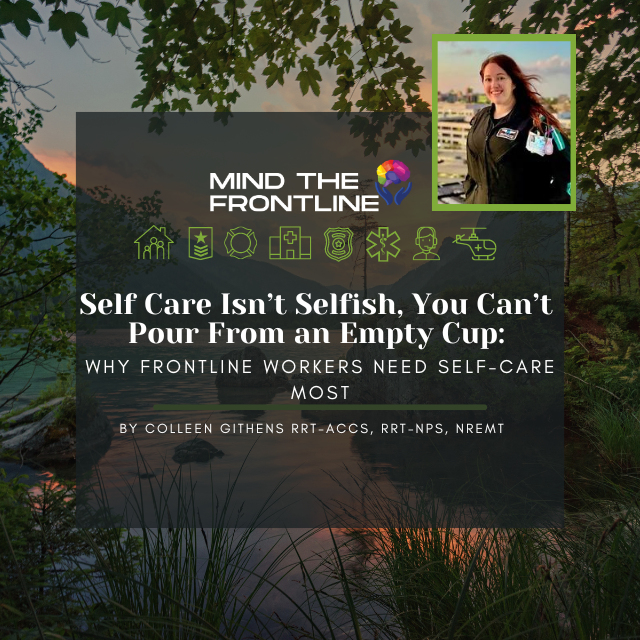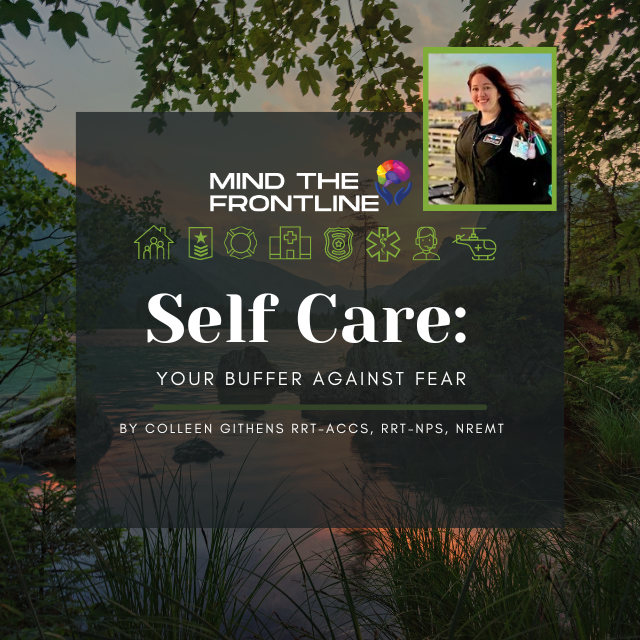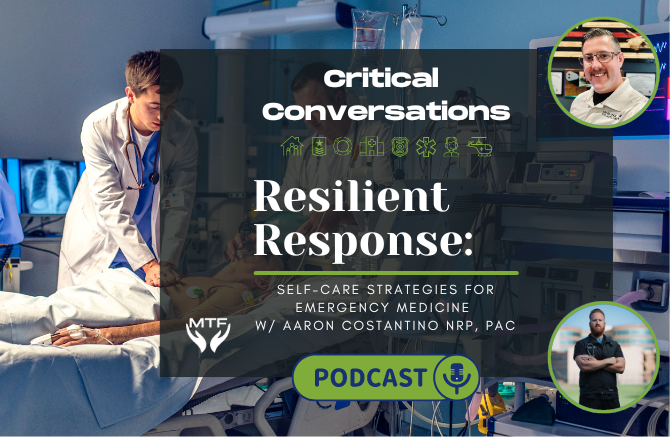The 4 Pillars of Self Care: Physical, Emotional, Mental, and Spiritual for First Responders and Veterans
Unlock the secrets to holistic well-being by mastering the four pillars of self-care, crucial for first responders and veterans.
6 min read
Colleen Githens RRT-ACCS, RRT-NPS, NREMT
:
Apr 21, 2024

We all know the saying, "You can't pour from an empty cup." This rings especially true for frontline workers – the firefighters, police officers, emergency medical technicians, and healthcare professionals who hold the line against emergencies and crises every single day. A staggering 45% of first responders report experiencing burnout, according to the International Association of Fire Fighters. In healthcare, the picture isn't much brighter, with a 2022 study by the National Academy of Medicine finding that over half of all healthcare workers reported burnout. These statistics paint a concerning picture of a workforce on the brink.
In our previous blog post, "Self-Care: Your Buffer Against Fear," we explored the challenges faced by our frontline peers and the importance of self-care in mitigating the emotional impact of their work. But let's face it – the idea of self-care can sometimes feel…selfish.
Sometimes, self-care gets a bad rap. It might feel selfish to take time for yourself when there's so much need around you. This mindset, however, is a dangerous misconception. Burnout often leads to feelings of exhaustion, cynicism, and detachment. In this state, it's easy to feel like taking time for yourself is a further burden on an already overloaded system. But here's the thing: taking care of yourself isn't selfish, it's essential. It's the oxygen mask principle – you secure your own mask first before helping others.
Our societal conditioning often emphasizes selflessness, particularly in helping professions. We might feel guilty prioritizing our own needs when colleagues and patients seem to depend on us constantly. But this guilt stems from a flawed perspective.
However, here's the critical truth: Self-care isn't about neglecting your responsibilities; it's about replenishing your resources so you can effectively fulfill them.

But here's the science – neglecting your physical and mental well-being has significant consequences. Studies estimate that 40% of healthcare workers develop conditions like depression and PTSD, compared to the 8-10% of the general population who experience PTSD according to the National Center for PTSD (2023). A burned-out first responder is less effective, less resilient, and ultimately less able to care for others.

Imagine a first responder rushing into a burning building. Without proper equipment and training, they wouldn't stand a chance. Self-care is your equipment and training for the emotional and mental challenges you face daily. Sometimes, the guilt of prioritizing self-care can be overwhelming. So, how do we reframe self-care as the essential act it truly is? Here's why we might feel that way, and how to shift our mindset:
From "I can't" to "I deserve to." Reframe negative self-talk. You deserve to prioritize your well-being. Think of yourself as a life raft. Would you deny a life raft air because it might seem "selfish" to another struggling swimmer? Of course not! A properly inflated raft can save multiple lives. Prioritizing your well-being allows you to be a stronger support system for those around you.
From "short-term sacrifice" to "long-term gain." Self-care fuels your energy and resilience, making you a more effective caregiver in the long run. Self-care isn't about indulgence, it's about investing in your long-term health and resilience. Just like a car needs regular maintenance to run smoothly, you need self-care to function at your best.
Redefine what "giving" means. Giving isn't just about outward actions. When you take care of yourself, you're giving yourself the strength, clarity, and compassion to be truly present for those who need you most.
From "burden" to "investment." View self-care as an investment in your ability to care for others.
From "alone time" to "strengthening connections." Self-care allows you to be more present and engaged in your relationships.
By taking care of yourself, you're not taking away from your work; you're enhancing your ability to show up fully for those who need you most. Remember, a full cup overflows, allowing you to pour more generously into the lives of others.
.png?width=205&height=134&name=Blog%20Pictures%20(9).png)
You know the feeling. The internal tug-of-war between taking a much-needed mental health day and powering through for the sake of your team, patients, or community.
.png?width=205&height=205&name=Self-Care%20Sunday%20(1).png)
Remember, self-care isn't a luxury, it's a responsibility. It's the armor that protects you from burnout and the fuel that propels you forward. By prioritizing your well-being, you're not letting anyone down – you're making yourself the best possible version of yourself, ready to serve your community with unwavering dedication.
Self-care doesn't have to be a solo act. Talk to your colleagues and supervisors about the importance of mental health and well-being. Advocate for flexible schedules, access to mental health resources, and a supportive work environment that prioritizes self-care.
Together, we can create a culture on the frontlines where self-care isn't seen as a burden, but as a badge of honor – a commitment to showing up, fully present, and ready to make a difference.
Self-care doesn't have to be grand gestures. Here are some simple but powerful practices to integrate into your routine:
Prioritize Sleep: Aim for 7-8 hours of quality sleep each night.
Healthy Eating: Nourish your body with balanced meals and snacks to maintain energy levels.
Physical Activity: Regular exercise is a powerful stress reliever and mood booster.
Mindfulness and Relaxation Techniques: Practices like meditation or deep breathing can help calm the mind and manage anxiety.
Connect with Loved Ones: Social support is crucial for emotional well-being.
Schedule Breaks: Don't skip breaks or meals during your shift.
Set Boundaries: Learn to say no and delegate tasks when needed.

Remember, self-care isn't a luxury, it's a necessity for frontline heroes. By prioritizing your well-being, you're not being selfish, you're becoming the best possible version of yourself – stronger, more resilient, and better equipped to serve your community.
Together, let's break the stigma surrounding self-care and create a culture where frontline heroes are empowered to prioritize their well-being. A healthy, resilient you is the best version of yourself to serve others.

Colleen Githens is the Lead State Ambassador and Social Media Manager for Mind The Frontline. Colleen has been a Registered Respiratory Therapist for 14 years. She holds her ACCS and NPS specialties, along with being a NREMT. A specialist in her field, Colleen has practiced respiratory care in all patient populations and demographics. Most of her career in high level critical care, including a neonatal and pediatric flight team. Colleen now is a RRT with the VA Healthcare System in Maryland. The safety, mental health, and wellness of her peers and herself has been a priority for many years. Colleen is also a mom of 2 humans and 2 pups, along with volunteering as a Puppy Parent with Warrior Canine Connection for a future Service Dog in Training.
References
American Psychological Association. (2019, April 3). Stress in America: https://www.apa.org/topics/stress
International Association of Fire Fighters. (2023). IAFF Wellness Resources. [IAFF] . https://en.wikipedia.org/wiki/International_Association_of_Fire_Fighters
National Academy of Medicine. (2022, September). Taking Action Against Clinician Burnout: A Call for Systemic Change. National Academies Press. https://nap.nationalacademies.org/catalog/25521/taking-action-against-clinician-burnout-a-systems-approach-to-professional
National Center for PTSD. (2023, July 26). PTSD: National Center for PTSD. Veterans Affairs (.gov) https://www.ptsd.va.gov/
National Institute of Mental Health. (2018, December). Burnout.
Explore many valuable First Responder Mental Health and Wellness resources on Mind the Frontline's online platform. Discover the link below to access a wide range of support and information tailored specifically for first responders.
Additional Mind the Frontline Resource's
Stay connected with Mind the Frontline on Instagram, Facebook, & LinkedIn.
$50 off code:frontline40
Invest in your mental health with the Mind Shield Health and Wellness Membership—a transformative resource tailored for first responders. For less than $4 per month, this 100% tax-deductible membership offers a suite of exclusive benefits designed to enhance your overall well-being.
Membership Highlights:
The Largest Online First Responder Mental Health and Wellness Resource Directory: Immediate access to a comprehensive database catering to the unique needs of first responders.
State-by-State Mental Health, Wellness, and Recovery Resources: Navigate a localized guide for personalized support.
MindShield 24/7 Debrief Hotline: Confidential and secure debriefing space, available whenever you need it.
Virtual 1-1 Peer Support: Connect with a supportive network of peers through our virtual platform.
Mind the Frontline's Preferred Mental Health Providers List: Access trusted mental health professionals aligned with our mission.
Discounts to Mental Health Apps: Exclusive discounts on leading mental health apps like Headspace and more.
Recommended Books, Podcasts, and Resources: Curated selection to enhance your mental health journey.
Weekly Blog Articles/Podcasts: Stay informed and inspired with regular content delving into crucial insights and topics.
Interactive Workshops and Webinars: Engage in dynamic sessions promoting mental health, career development, and overall well-being.
Mindfulness and Meditation Resources: Tools for incorporating mindfulness into your daily routine.
-3.png)
Unlock the secrets to holistic well-being by mastering the four pillars of self-care, crucial for first responders and veterans.

The relentless nature of frontline work takes a significant mental health toll. A staggering 45% of first responders report experiencing burnout,...

Discover effective self-care strategies and team dynamics in emergency medicine to enhance well-being and resilience among first responders.